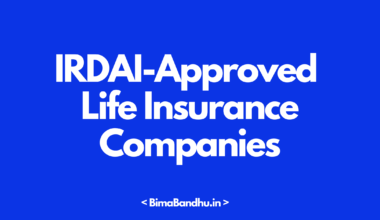Life insurance purchase is essential for every individual. However, in many cases, people look forward to getting life cover through their employers. Since buying an individual life insurance policy might not be feasible for every organization, it is where they resort to group life insurance policies.
Let’s take a deeper ride into understanding various facets of group life insurance.
What is Group Life Insurance? – Definition
A group life insurance plan, as the name suggests, covers a group of individuals under one plan. It is mostly offered by employers or large-scale entities, such as a welfare association or union, to the group members. In insurance terminology, it is a single insurance agreement/contract that extends to a group of people for providing life cover.
One of the reasons why many companies include group life insurance into their employee welfare schemes is its low cost. This type of life insurance plan also helps them secure significant costs. In some cases, the employers also ask the group members to contribute a minimum amount or participate in the policy for a specific period before they start getting life insurance coverage.
Here are a few more pointers related to group life insurance:
- Group members getting life insurance coverage under this type of plan may not have to pay anything out of pocket.
- A portion of the salary gets deducted in case they select additional insurance coverage benefits along with the basic coverage provided under the group plan.
- Just like other life insurance policies, it is easy to change beneficiaries listed under group life insurance at any point during the select coverage tenure.
Read More: All About Life Insurance in India
How Does Group Life Insurance Work?
Under group life insurance, the organization or employer buying the policy retains the master contract. The group members or employees who receive life insurance coverage under the policy get a policy certificate that details out the benefits, features, and terms of the master policy.
In case of the unfortunate demise of any of the group members, the enrolled beneficiary can file a claim to receive the group life insurance benefits.
What are the Requirements of Group Life Insurance?
Some of the basic requirements to be fulfilled to get group life insurance benefits are:
- Group members covered under the selected policy may need to pass a certain period before becoming eligible for the insurance benefits.
- The employers may ask the employees to pay a certain amount for life insurance coverage under the group plan.
- Life cover under this type of plan is valid or remains intact as long as the insured continues to be part of the group. Once a group member leaves – through resignation or termination, the coverage ends.
Advantages of Group Life Insurance
- The most attractive element of a group life insurance policy is its value for the cost incurred. Individuals in the group typically do not pay anything or a very little amount.
- Qualifying for group life insurance is easier in comparison to buying individual life insurance plans.
- In most cases, group members do not need to undergo medical exams.
- Many organizations allow the group members to select additional voluntary coverage at a less expensive rate. These additional insurance benefits may also be portable between jobs and require applicants to answer a medical questionnaire.
Disadvantages of Group Life Insurance
- Most group plans only provide basic life insurance coverage, which may not fulfil the needs of the insured individuals. Hence, it is suggested that individuals should consider its benefits as a perk of employment and buy distinct individual life insurance with sufficient coverage alongside.
- The control of the master group policy lies in the hands of the manager of the group (employer). If the manager chooses to terminate the policy, the group members will lose insurance benefits.
What are the Benefits of Group Life Insurance?
Almost any group of individuals, regardless of their profession or age, can be covered under a suitable group life insurance policy. In the current day and age, group life insurance has become a crucial form of life insurance for both employers and employees. Given below are several advantages or benefits of a group life insurance plan:
Benefits for Employees
- These plans are available at a comparatively lower cost than individual life insurance plans and provide a default cover to all the group members.
- In most cases, there are no pre-requisites like medical screening, involved in getting enrolled in a group life insurance policy.
- It is easier to file a claim under a group life insurance policy.
Benefits for Employers
- With the right group life insurance policy, employers can significantly reduce their expenses instead of buying a comparatively costlier, individual life insurance plan.
- Offering life insurance to employees acts as a significant incentive, which helps reduce the employee attrition rate.
- It also helps employees work with high morale in a stress-free manner, knowing that their lives are insured.
- Employers can save taxes by declaring the premium paid for a group life insurance plan as per the Income Tax laws in India.
What are the Different Types of Group Insurance Plans?
In addition to the group policy purchased by the employers, there are several other types of group insurance policies available in the market, including:
- Gratuity
- Superannuation
- Savings plan
- Group term plan
- Group credit protection plan
Also Read: Types of Life Insurance Plans
What are the Drawbacks of Group Life Insurance Plans?
- The premium of most of the group life insurance plans is quite low based on the limited insurance coverage they offer. This is what makes individuals look for an additional life insurance plan.
- Group life insurance coverage offered by your employer may not cover your children or spouse.
You May Like to Know About: IRDAI-Approveed Life Insurance Companies in India
Group Life Insurance FAQs
-
What is the primary purpose of group life insurance?
The primary purpose of a group life insurance plan is to provide financial support to the family of the insured individuals within a group in case of untimely demise.
-
Who can buy group life insurance policies?
The following groups or institutions are eligible to buy group life insurance policies:
- Employer-employee groups
- Banks
- NBFCs
- Non-Employer-employee groups
- Professional groups
- Microfinance institutions
-
What is group term life insurance?
It is a type of term insurance plan in which a single contract covers multiple individuals in a group.
-
Do group life insurance plans pay out?
Like many other types of life insurance plans, group life insurance also pays out the sum assured or death benefit as per policy terms to the designated beneficiary in case of the insured’s demise.
-
What happens to group life insurance when group members retire?
In most cases, the benefits of group life insurance are available till the time an individual remains a part of the group till the retirement age. However, you may find some group insurance plans that continue to cover the group members after retirement.
Get the Right Knowledge About Group Life Insurance at BimaBandhu
The selection of a suitable group life insurance plan is crucial to offer maximum benefits to the group members. While there are several group life insurance policies available in the market, it is important that you gain relevant information about what it is and how it works before buying any plan. Make BimaBandhu your knowledge partner for group life insurance selection!






